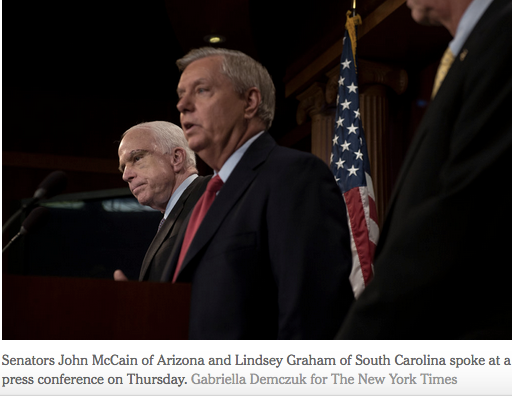WASHINGTON — The closing argument was a curious one: Vote yes, Republican leaders told the holdouts in their conference. We promise it will never become law.
After seven years of railing against the evils of the Affordable Care Act, the party had winnowed its hopes of dismantling it down to a menu of options to appease recalcitrant lawmakers — with no more pretenses of lofty policy making, only a realpolitik plea to keep the legislation churning through the Capitol by voting to advance something, anything.
They ended up with nothing.
By the early morning hours of Friday, the animating force of contemporary Republican politics lay in ashes, incinerated by three Republican senators — John McCain of Arizona, Susan Collins of Maine and Lisa Murkowski of Alaska. But the spark can be traced back to the hot summer of 2009, and to Winterset, Iowa.
Obamacare Saved, but Just Barely
Ultimately, this deceitful campaign ran aground by the narrowest of margins in the Senate thanks to the three Republicans and all 48 Democrats and independents. Much attention has rightly focused on Mr. McCain. Returning to the Senate after surgery and a brain cancer diagnosis, he delivered a stirring speech on Tuesday calling on lawmakers from both parties to reach “agreements made in good faith that help improve lives and protect the American people.” He seemed to go against those sentiments early in the process when he voted to start debate. But, when it really counted, Mr. McCain did the right thing. An equal or larger amount of credit ought to go to Ms. Collins and Ms. Murkowski, who stood firm despite immense political pressure and, in Ms. Murkowski’s case, shameful threats by the Trump administration.
I hope we can rely on humility, cooperation & dependence on each other to better serve the people who elected us https://t.co/QbaZvUwkfE
— John McCain (@SenJohnMcCain) July 25, 2017
By contrast, senators like Shelley Moore Capito, Dean Heller and Rob Portman who had made a big show of protecting their constituents readily gave in to party leaders. They allowed the Senate to come within one vote of passing a bill that would have left 16 million more people uninsured and driven up insurance premiums by about 20 percent a year.




